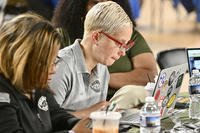When Catherine DeLeal left the Marine Corps with six years of active duty and three deployments in three years to Iraq, she didn't think about the emotional side effects of transition. She just knew it was the right move for their family.
A Naval Academy graduate, DeLeal came from a family with a long tradition of military service and she married a fellow Marine.
Balancing two military careers was difficult enough, but when they were ready to have children and realized they would likely be sent two different bases, DeLeal and her husband decided it was best for her to get out and for him to continue serving. He had more time in service and was much closer to retirement.
This meant that, rather than transitioning away from active-duty military life together, DeLeal went through that adjustment on her own.
Military.com: Think back to before you got out. What did you think transition would be like?
DeLeal: I didn't think it would be very complicated. I just thought I'd figure out what I was going to do next and set to it, whether it was get a job, go back to school or have a baby. I never stopped to consider the emotional aspects.
Q: How did what actually happened compare to what you imagined?
A: In some sense, the logistical aspects have been easy enough. It's been the emotional aspects that I wasn't prepared for, and frankly I don't think I could have done much to prepare for them.
Q: Did you experience any surprises with your transition? What were they?
A: The finances were easy enough for us to coordinate because so much stayed the same -- like health care -- or was predictable, like Basic Allowance for Housing or pay raises.
What has been my personal Achilles' heel is missing what I did have on active duty: I miss the autonomy, the sense of purpose that what I was doing was equally important as what he is doing, and I miss the feeling of accomplishment that came with earning my promotion or my FITREP bullets or my company earning something. I just really miss being a Marine sometimes.
Q: What do you wish you could go back and tell yourself about military transition?
A: Make sure you are really well and truly done with the Marine Corps before you leave.
Q: What was your biggest military transition mistake? How do you wish you'd prepared yourself?
A: Not picking a better paying or truly more portable second career. My career field doesn't relocate well. I think I might have been more adamant about finding a nursing school since that seems to be the only career that I see other spouses in where they can truly follow the active-duty spouse anywhere and find work relatively easily.
If I knew of a way to better prepare myself emotionally for what I would miss, then that would have been worthwhile. But, frankly, I don't think that's even possible.
Q: What transition resource did you love?
A: I don't know that I used many of them, to be honest. So many were targeted to junior enlisted, to people moving directly into the workforce, or to people who were not remaining connected to the military. In other words, they were meant for people who were anchored in a community rather than who would continue to be transient nomads.
Q: What transition tool do you wish you had?
A: I wish that there was a better way for assisting spouses getting off active duty who are staying married to the service. But frankly, I'm not exactly sure what that would even look like.
-- Do you have a military transition story to share? Email amy.bushatz@military.com to be considered for this series.





























